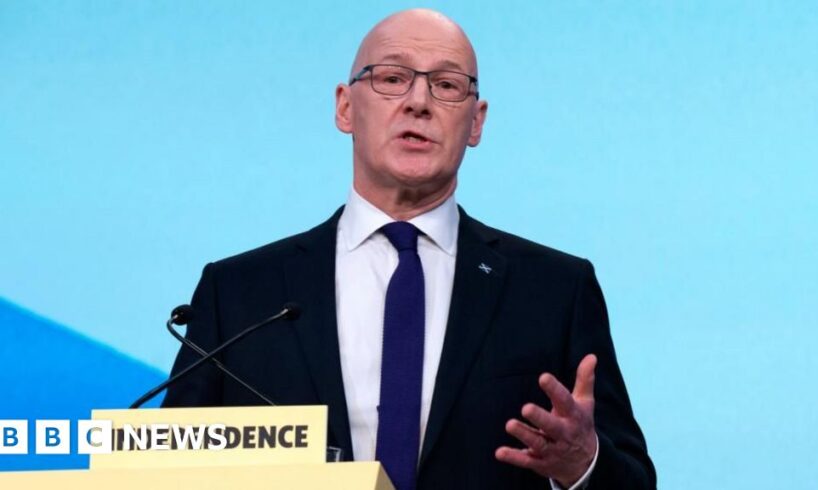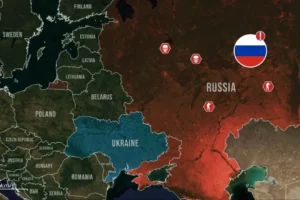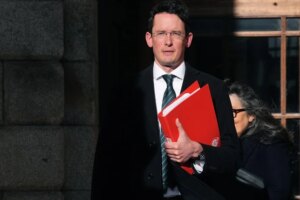
Chris MasonPolitical editor in Aberdeen
PA Media
John Swinney was the third SNP leader in a little over a year
A year or so ago, the Scottish National Party looked to be in deep trouble.
They had been comprehensively thrashed in the general election, falling from 48 MPs to just nine.
They had managed to have three leaders in a little over a year: Nicola Sturgeon, Humza Yousaf and then John Swinney.
It was a rate of attrition that would make even the Conservative Party of recent years blush.
There had also been a high-profile and long-running police investigation into the SNP’s finances, involving Sturgeon, who was told earlier this year she would face no action.
Plus there were bitter rows over gender identity.
And the SNP has been in devolved government in Scotland since before you could buy an iPhone – since May 2007.
Electoral gravity looked to be catching up with them, and catching up big time – just ahead of the crucial elections to the Scottish Parliament next May.
PA Media
John Swinney, with Humza Yousaf and Nicola Sturgeon
But in case you needed yet another reminder that our domestic politics remains a smorgasbord of competitiveness and unpredictability, the SNP is the latest case study.
Swinney has brought stability to a party that indulged in the opposite for a while.
And support has splintered among its rivals – Labour, Reform and others.
Here is how the pollsters More in Common put it:
“Since last year’s general election, Labour’s support has more than halved in Scotland while the SNP has marginally improved its standing. While not seeing as significant a rise as in England, Reform has emerged as the potential second-place party after the SNP in Scotland, suppressing the Conservatives’ vote share as well as eating into Labour’s.”
Its analysis continues:
“Despite losing 11 points in the constituency vote, this result would put the SNP just shy of a majority in Holyrood, mostly due to fragmentation in the other parties.”
Remember, this is a snapshot, not a prediction. But it is fascinating nonetheless.
The mood among SNP party members and senior figures at the conference was chipper and upbeat.
The party feels competitive again and not only hopeful of victory next year, but even talking of that outright majority.
Just winning again, with or without a majority, would be an extraordinary achievement.
The party, if it does so, would he heading into its third consecutive decade in devolved power.
A majority is a big ask, with an electoral system that makes securing one tricky.
But it matters because the SNP’s latest attempt to make an argument for another independence referendum rests on securing a majority.
The party’s logic goes like this: the last time they persuaded the government at Westminster to grant one, they had won a majority at Holyrood a few years before.
That majority was won by Alex Salmond in 2011. The referendum followed in 2014.
So, goes the current First Minister’s logic, they need a majority again so they can point at that precedent from a decade and a half ago.
PA Media
Swinney is hoping to emulate the electoral success of Alex Salmond in 2011
The stumbling block is the UK government has made it clear, including in its manifesto, that it is opposed to another referendum.
Privately, senior SNP folk ponder that if they do win a majority, and Labour lose power in the Senedd in Wales and do badly in local elections in many parts of England, Sir Keir Starmer might be out of Downing Street.
There are a lot of ifs there and who knows.
But even if Sir Keir was a goner, that manifesto would still be something Labour could point to.
And the SNP would ask, again, just how voluntary the union of the United Kingdom really is if there is no achievable mechanism for another referendum.
The SNP’s critics point to what they see as a dismal domestic record, on the NHS, housing and the number of deaths among drug addicts, for instance.
The party counters with its own riff on what it sees as its greatest hits – they had one for every stair between the ground and first floor of the conference centre.
Free university tuition and free prescriptions are among them.
But there is something else going on too.
There is a near 50/50 split on the constitutional question in Scotland – independence or not.
This is a nation split down the middle.
This gives the SNP a deep well of potential support.
It offers the opportunity to continue to defy what in other circumstances would likely be the undeniable gravity of longevity in office – plunging to defeat.
Let’s see.
In local politics, politics in the nations and at the UK level, conventions continue to be upended in multiple directions.
It is also true – and the SNP and its rivals know it – things can change quickly too.





